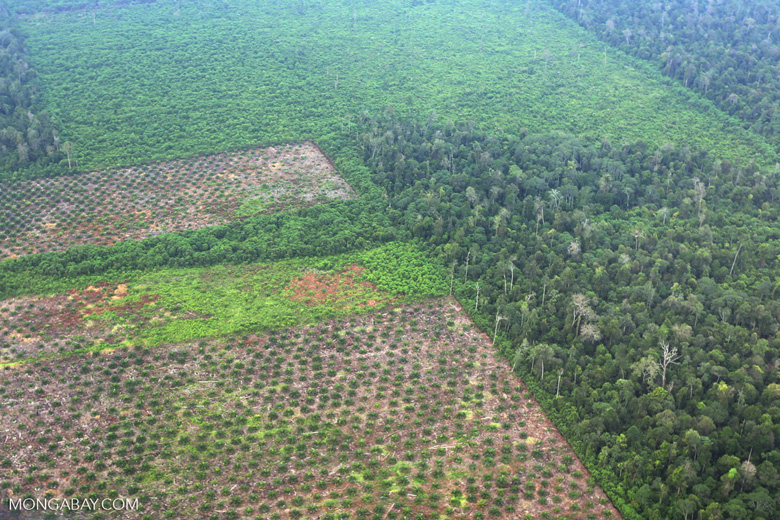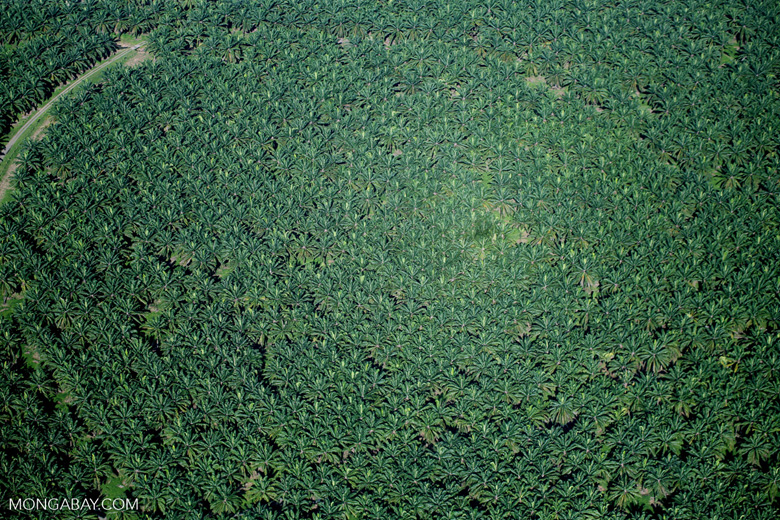Due to its widening impact on tropical forests yet high profit margins, palm oil is one of the most polarizing crops in the tropics. Scientists and environmentalists warn of the high ecological costs caused by converting peatlands and rainforests for oil palm plantation, but growers and food producers argue that as the highest-yielding oilseed, palm oil is a critical part of the solution to feeding a growing human population as well as a profitable form of land use in otherwise poor areas.
As part of the effort to find a compromise, over a decade ago a multitude of stakeholders came together to form the Roundtable on Sustainable Palm Oil (RSPO), a body that sets certification criteria for greener palm oil production. Palm oil produced under that standard first started to reach markets in 2008, yet demand has failed to keep pace with supply. Thus there is no meaningful price premium for certified palm oil, nor has there been much of an incentive to improve the standard.
However the situation is rapidly changing due to a groundswell of “deforestation-free” commitments being adopted by palm oil buyers, traders, and producers. While RSPO criteria underpin these policies, they nonetheless go well beyond the standard. That movement — driven largely by activist campaigns — has put pressure on the RSPO, raising questions about its relevance going forward.
 Great apes, like the lowland gorilla (above) and Sumatran orangutan (below), are losing habitat to oil palm expansion. RSPO criteria bar conversion of forests containing either species. Photos by Rhett A. Butler.
Great apes, like the lowland gorilla (above) and Sumatran orangutan (below), are losing habitat to oil palm expansion. RSPO criteria bar conversion of forests containing either species. Photos by Rhett A. Butler.
This week the RSPO took a step that could put it back in the spotlight. On Tuesday the body announced RSPO+, a new set of voluntary guidelines “aimed at further enhancing the existing standard’s requirements on issues such as Deforestation, Peatland Development and Indigenous Peoples rights,” according to the group.
“We will maintain our vision to make sustainable palm oil the norm. We are confident that this addendum will promote the work of growers who have decided to move faster in their sustainability practices, while making sure we keep everyone on board and travel together towards market transformation,” said Darrel Webber, Secretary-General of the RSPO. “This addendum will help our producer and buyer members to use the RSPO platform to better explain, demonstrate, and communicate how they are addressing issues around peat, deforestation and social issues.”
RSPO says the guidelines, which would function as an addendum to the existing RSPO Principles and Criteria, are currently under development. A draft will be presented to the board of governors next month.
“The voluntary addendum will provide clear implementation guidelines and, in compliance with RSPO commitment to full transparency, inclusivity and neutrality will be assessed by third party accredited auditors in order to provide the necessary level of assurance demanded by stakeholders,” said the RSPO in a statement. “This action by the RSPO reflects the growing concerns with these issues and extensive discussions within the RSPO on how best to integrate these within the existing standard. It aims at fulfilling the current market and society demands for stronger sustainability requirements, while maintaining the inclusivity of the standard, in its vision of 100% market transformation.”

Clearance of peat forest for oil palm in Sumatra, Indonesia.
As the dominant standard for the production of a controversial crop, the RSPO has been harshly criticized by various parties. Some environmentalists say the standard is too weak and insufficiently enforced, while on the other side, some plantation companies balk at the cost of compliance. Smallholder farmers have also be challenging to bring into the system, although the RSPO has now certified more than 100,000 through its smallholder program.
The issues around palm oil are important because it has quickly become a major form of forest land use in the tropics, especially in Malaysia and Indonesia, but also increasingly in the Americas and Central and West Africa. Areas where expansion is happening the fastest tend to be those with high carbon stocks and rich biodiversity, exacerbating the environmental impacts of the crop. Expansion has also increased conflict between traditional land users and palm oil companies, especially in areas where land rights are insecure. In an effort to address these challenges, “deforestation-free” commitments and the RSPO are now placing more emphasis on social safeguards, like seeking “free, prior informed consent” (FPIC) from local communities prior to developing new plantations. But sorting out those conflicts is often more complex than addressing the environmental issues associated with palm oil, a point that activists are now pushing harder on as they campaign in the sector.
Palm oil is widely used as a cooking oil. It is commonly found in cosmetics, cleaning products, and processed foods like crackers, cookies, and chips.

Oil palm plantation








